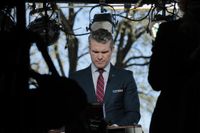On March 28, 2025, U.S. Defense Secretary Pete Hegseth will embark on his first official trip to Asia, starting with a visit to the Philippines. This two-day visit is poised to include critical discussions with Philippine leaders, including Defense Secretary Gilberto Teodoro and President Ferdinand Marcos Jr. As tensions grow in the South China Sea due to China's increasing assertiveness, talks are expected to focus on strengthening deterrence and providing more substantial support to Philippine security forces. Philippine Ambassador to the U.S., Jose Manuel Romualdez, emphasized that enhancing bilateral relations will be a cornerstone of Hegseth's discussions, reflecting a unified front against China's extensive territorial claims in the region.
Following his meetings in the Philippines, Hegseth will continue his trip with stops in Hawaii, Guam, and Japan. His itinerary includes participating in the 80th anniversary commemoration of the Battle of Iwo Jima, underscoring a commitment to maintaining historical ties and mutual defense. During his visit to Japan, he is also set to meet with Defense Minister Gen Nakatani and other officials to boost U.S.-Japan cooperation amid ongoing regional challenges.
The timing of Hegseth's visit coincides with the annual "Balikatan" exercises scheduled for next month, marking the largest joint military drills between the Philippines and the United States, held near the contested waters of the South China Sea. Romualdez noted that these military drills and Hegseth's visit send a strong message of solidarity between the two nations at a time when China's maritime ambitions threaten regional stability.
In a previous call with Teodoro regarding security obligations, Hegseth reaffirmed the U.S. commitment to the Mutual Defense Treaty established in 1951, which underlines the importance of U.S.-Philippine cooperation in ensuring a secure Indo-Pacific. This commitment has been reiterated multiple times in light of escalating tensions, particularly between Chinese and Philippine maritime forces.
While the U.S. strengthens its alliances in the region, concerns are mounting regarding China's response to increased American engagement. Chinese officials have warned the U.S. to refrain from interfering in what they consider domestic affairs, cautioning that such actions could upset regional stability.
During the trip, questions regarding the recent Pentagon meeting involving Elon Musk and its ramifications for U.S.-China relations are likely to arise. Hegseth has previously mentioned that discussions would revolve around innovation and production efficiencies, but amid Musk's long history of investments in China and his connections with Beijing, both Japanese and Philippine officials may seek clarity regarding his role and potential influence over U.S. defense strategy.
Retired Rear Admiral Mark Montgomery expressed concern that the unpredictable nature of current U.S. foreign policy, particularly under President Trump, has left U.S. allies on edge. “All of our Asian allies are already on pins and needles because of the treatment of a long-perceived ally like Ukraine,” Montgomery commented on the complexities of the U.S. approach to partnership and alliance management.
Critics of Musk's proximity to the U.S. government highlight the potential risks of granting significant access to classified information, raising alarms over national security implications. Representative Ami Bera, a member of the House Permanent Select Committee on Intelligence, asserted that too much access could create vulnerabilities in U.S. defense strategies. However, House Select Committee on China Chair John Moolenaar responded to these concerns by stating that proper protocols ensure classified briefings are managed with care.
As Hegseth prepares for this pivotal trip, the geopolitical landscape in the Indo-Pacific remains fraught with uncertainty, particularly with rising tensions surrounding China's territorial disputes and the U.S.’s response to them. With both military and diplomatic engagements on the agenda, this visit aims to bolster partnerships that are essential in navigating the complex security landscape of the region.
This forthcoming trip is anticipated to strengthen not only the U.S. position in the Indo-Pacific but also its commitment to maintaining peace and stability in the face of evolving threats. The implications of these discussions will resonate beyond bilateral relations, impacting regional security dynamics as the U.S. and its allies seek to counterbalance China’s assertive maneuvers.



